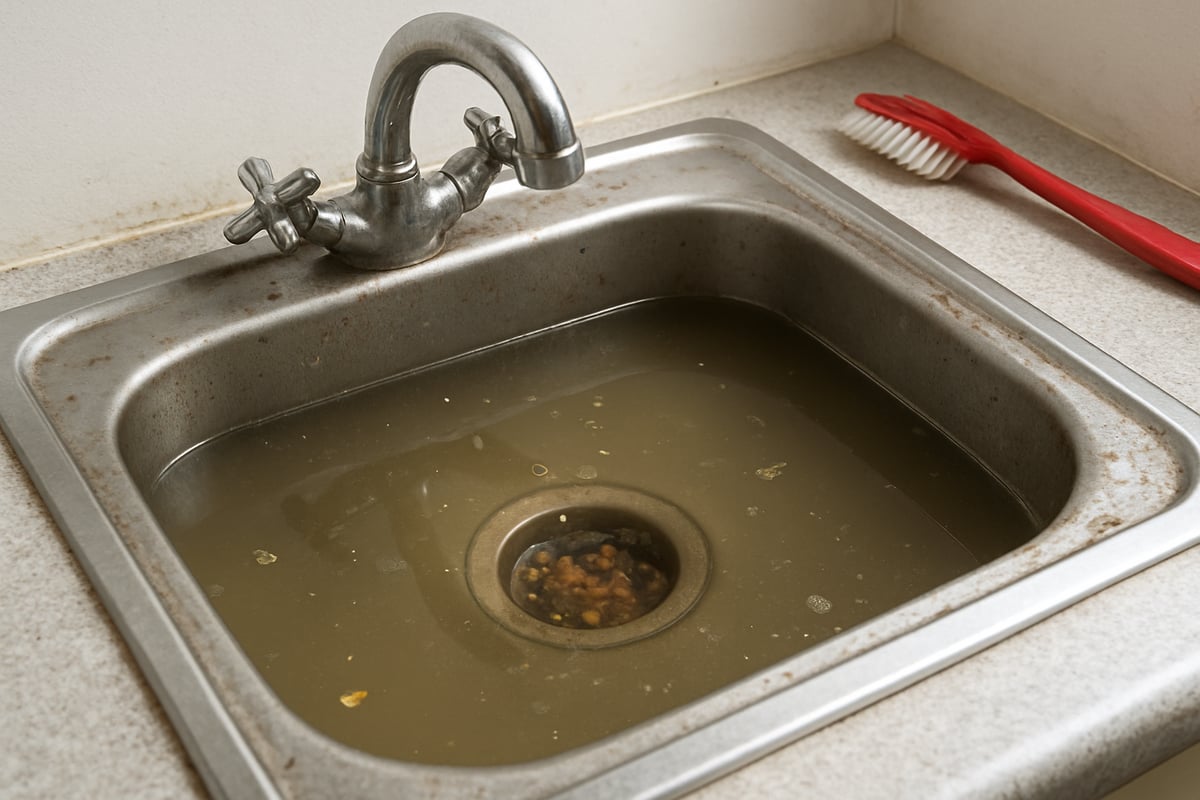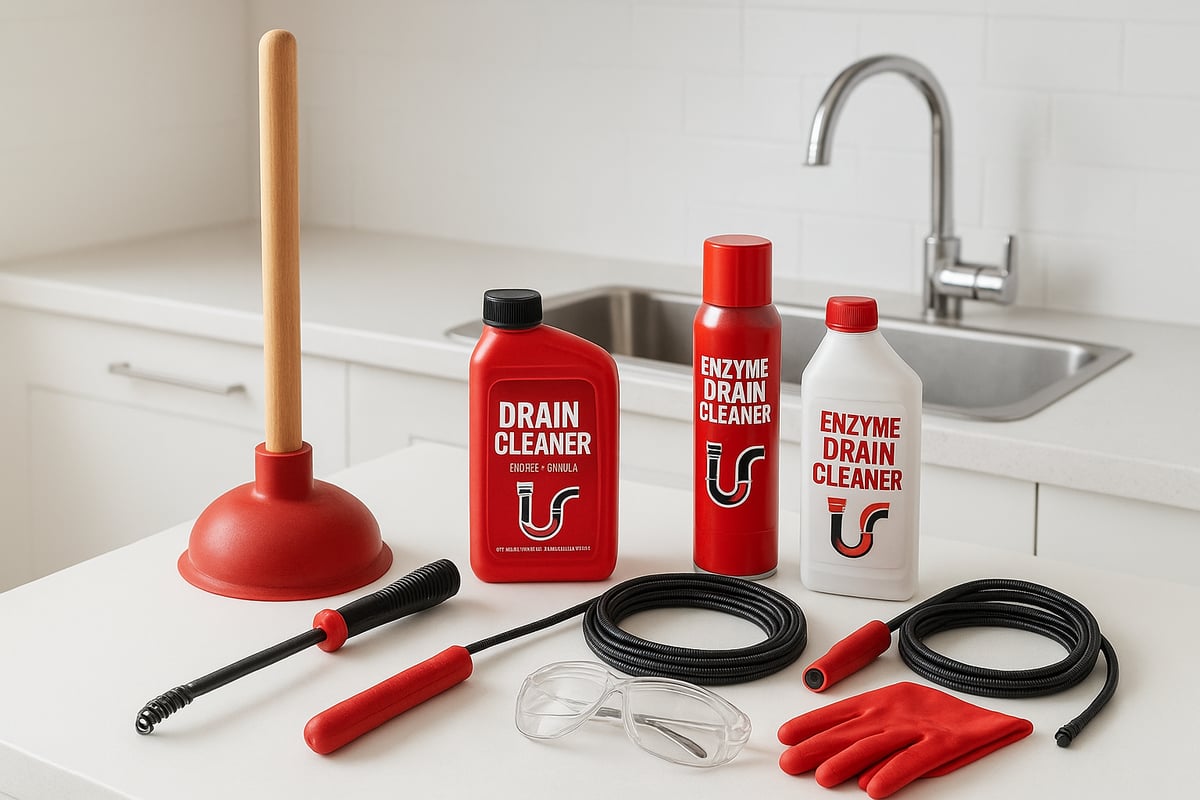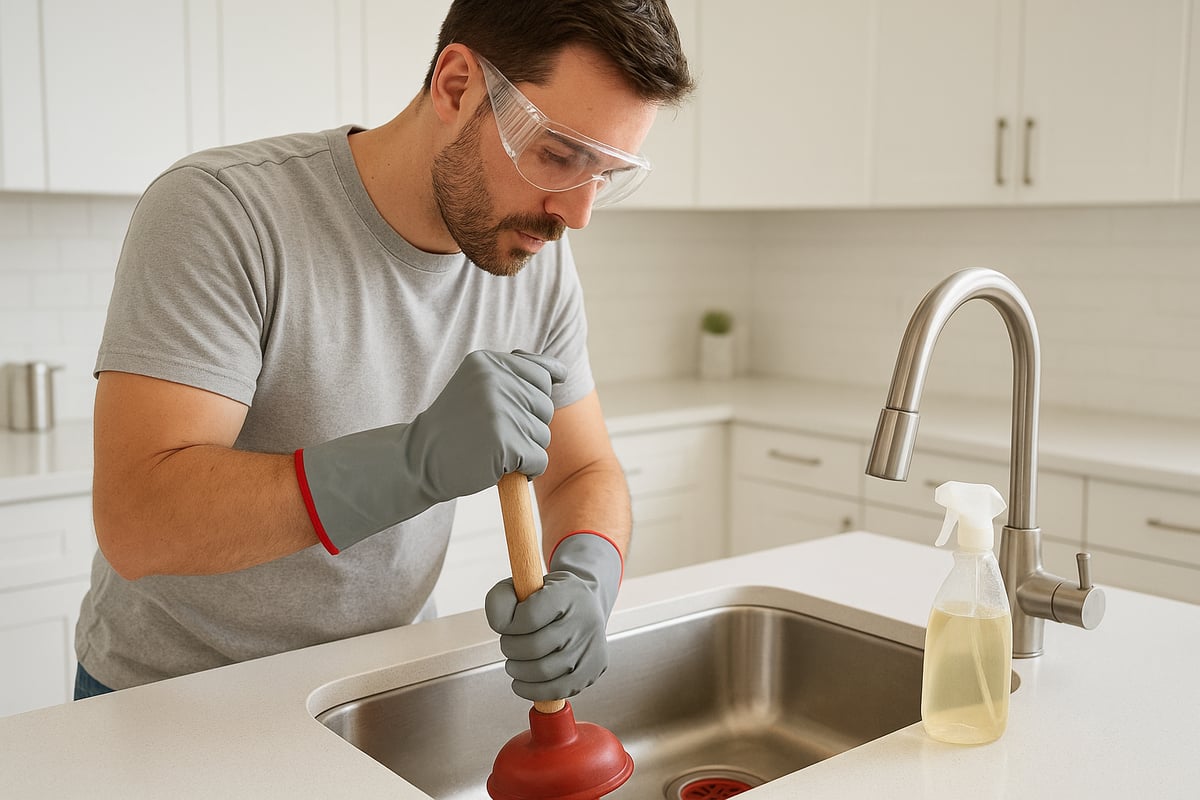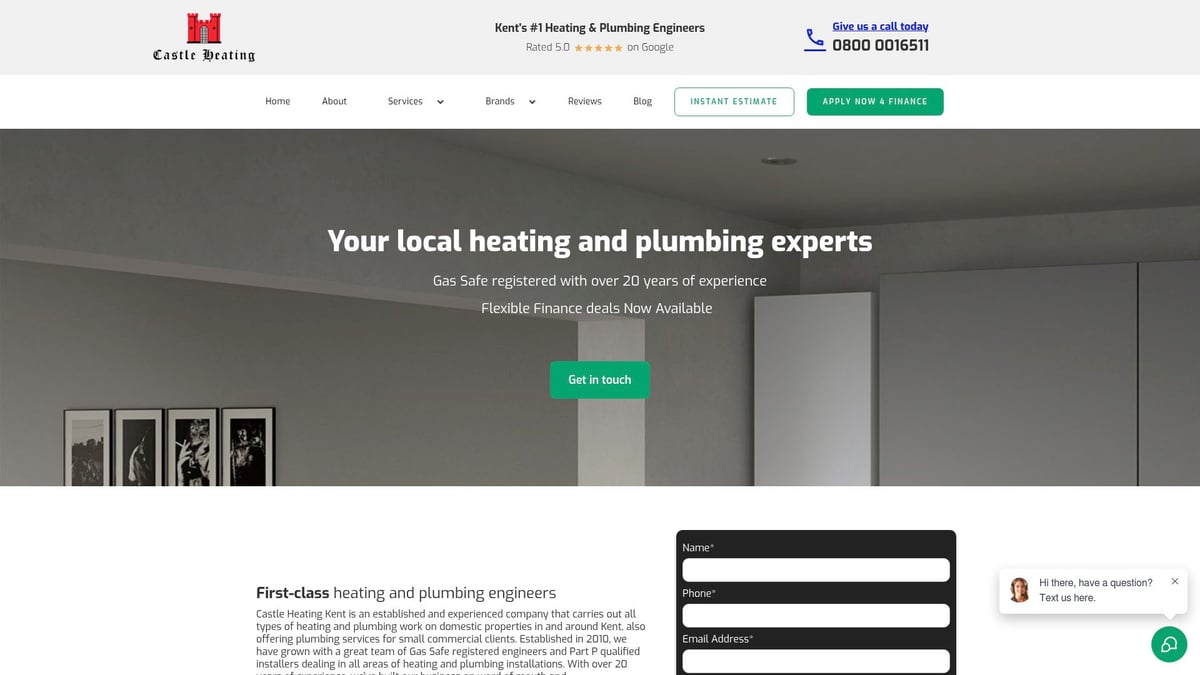Blocked Sink Plumber Guide: Solutions for Homeowners 2025
Tired of standing water or unpleasant smells coming from your sink? You are not alone, as many UK households face these frustrations every year. A blocked sink plumber is often the first call when water will not drain or odours linger, but what if you could solve or prevent these issues yourself?
This 2025 guide provides practical, up-to-date solutions for diagnosing, fixing, and avoiding blocked sinks. Discover the leading causes, step-by-step DIY fixes, essential tools, and clear signs it is time to call a professional. With expert-backed advice, you can enjoy a hassle-free home and act confidently when a blocked sink plumber is needed.
Understanding Blocked Sinks: Causes and Warning Signs
Blocked sinks are a nuisance for many UK households, often leading to unpleasant odours and inconvenience. Recognising the causes and early warning signs is crucial for resolving issues quickly and knowing when to call a blocked sink plumber.

Common Causes of Sink Blockages
Several factors contribute to the need for a blocked sink plumber. The most frequent causes include:
- Food waste, such as vegetable peels and coffee grounds, commonly found in kitchen sinks.
- Grease and fat, which solidify inside pipes and form stubborn blockages.
- Hair and soap scum, especially in bathroom sinks and showers.
- Hard water scale, a significant issue in regions like Kent, can narrow pipes over time.
- Non-biodegradable items (wipes, cotton buds) make clogs worse if flushed or rinsed down the sink.
Over 60% of UK households experience sink blockages annually (Water UK). For example, a kitchen sink blocked by a mix of coffee grounds and fat can require professional intervention.
Early Warning Signs of a Blocked Sink
Spotting early symptoms can help you avoid a call to a blocked sink plumber. Common warning signs include:
- Water draining slowly after use.
- Bubbling or gurgling sounds from the plughole.
- Foul odours, often described as musty or rotten.
- Water backing up in neighbouring fixtures, like a bath or toilet.
Consider this: if your bathroom sink gurgles when you flush the toilet, it signals airflow disruption in the pipes, which may indicate a growing blockage.
Health and Home Risks of Ignoring Blockages
Ignoring a blocked sink plumber’s advice can put your home and health at risk. Stagnant water and trapped debris encourage:
- Mould growth around sink cabinets and walls.
- Bacterial build-up that could trigger allergies or illness.
- Leaks and water damage, especially if pipes burst.
| Risk Type | Impact Example | Data Point |
|---|---|---|
| Mould | Warped wood under kitchen cabinet | 30% higher pipe burst risk (UK Home Insurance Reports) |
| Bacteria | Unpleasant odours, illness | |
| Water Leak | Costly repairs, structural damage |
A leak beneath your kitchen cabinet can quickly lead to warped wood and expensive repairs if left unresolved.
When to Suspect a Deeper Plumbing Issue
Sometimes, even a skilled blocked sink plumber may find that the problem runs deeper. Warning signs include:
- Multiple fixtures (sink, bath, toilet) blocked at the same time.
- Persistent blockages, even after repeated DIY attempts.
- Symptoms of main drain or vent stack issues, such as water backing up after heavy rainfall.
If your entire house experiences slow drainage following a storm, it could be time to consult a professional. For severe or recurring problems, consider exploring drainage services for blocked sinks to address the underlying issue.
Essential Tools and Products for Clearing Blocked Sinks
When facing a troublesome kitchen or bathroom drain, the right tools are essential for any homeowner or blocked sink plumber. Whether you are tackling a minor clog or preparing for more stubborn blockages, equipping yourself properly makes a significant difference in results and safety.

Must-Have DIY Tools
Every blocked sink plumber and keen DIYer should have a basic toolkit ready for unexpected clogs. The essentials include a cup plunger for sinks and a flange plunger for toilets, each designed for their specific purpose. A hand auger or drain snake is invaluable for reaching deeper blockages that plungers cannot dislodge. For persistent clogs, a wet/dry vacuum can extract trapped debris efficiently.
- Cup plunger: Best for flat sink drains
- Flange plunger: Designed for toilets
- Hand auger: Flexible, reaches beyond the trap
- Wet/dry vacuum: Removes stubborn material
For a detailed look at when to escalate from DIY to professional help, see General plumbing repairs and maintenance. Investing in these tools empowers homeowners to resolve many blockages before calling a blocked sink plumber.
Effective Chemical and Natural Solutions
Choosing the right cleaning solution is just as important as selecting the correct tool. Enzyme-based drain cleaners are a preferred option among homeowners and the modern blocked sink plumber, as they break down organic matter safely and reduce pipe corrosion risk by up to 50%. Caustic chemicals work quickly but carry risks of pipe damage and require careful handling.
For a natural approach, the classic baking soda and vinegar method is both eco-friendly and effective for minor blockages. Simply pour baking soda down the drain, follow with vinegar, wait 15 minutes, then flush with hot water. Here is a quick comparison:
| Solution Type | Pros | Cons |
|---|---|---|
| Enzyme-based | Safe, reduces corrosion | Slower acting |
| Caustic chemical | Fast, strong | Risk of pipe damage |
| Baking soda/vinegar | Eco-friendly, cost-effective | Works on light clogs only |
A blocked sink plumber will often recommend enzyme cleaners for regular maintenance to keep your pipes healthy.
Modern Gadgets and Innovations for 2025
Innovations in plumbing have made life easier for both homeowners and the blocked sink plumber in 2025. Smart drain monitoring devices now alert you to slow drainage before a complete blockage forms, helping you take action early. Eco-friendly drain maintenance pods release bacteria that consume organic debris, reducing the need for harsh chemicals.
Water jetting tools have also become more accessible for advanced DIYers, offering a powerful method for clearing stubborn clogs without damaging pipes. These gadgets are particularly useful for those wanting to prevent recurring issues and maintain a smoothly flowing system.
Embracing these modern solutions can help any blocked sink plumber work more efficiently and safely in today's homes.
Safety Precautions and Best Practices
Safety should always be your top priority when tackling a blocked sink plumber task. Always wear protective gloves and goggles to shield yourself from splashbacks or chemical exposure. Ensure the area is well-ventilated, especially when using chemical cleaners, and never mix different products as this can release hazardous fumes.
Handle all tools and chemicals according to manufacturer instructions to avoid injury or pipe damage. If you experience skin irritation or suspect a chemical burn, seek medical advice immediately. Remember, even experienced DIYers should know their limits—when in doubt, consult a professional blocked sink plumber for guidance.
Step-by-Step DIY Solutions for Blocked Sinks
Tackling a blocked sink can feel daunting, but with a systematic approach, most homeowners can resolve minor clogs with confidence. This section guides you through each essential step, ensuring both safety and effectiveness. If you follow these steps and use the right tools, you may not need a blocked sink plumber for every minor issue.

Step 1: Initial Assessment and Preparation
Begin by identifying where the blockage is located. Is it in the U-bend trap, a branch pipe, or potentially the main line? A careful assessment saves time and prevents unnecessary dismantling.
Gather all necessary tools: gloves, goggles, a plunger, and perhaps a bucket. Safety is paramount, especially if you suspect chemical residue from previous attempts. If water is overflowing or risk of spillage is high, shut off the water supply to the affected sink.
For example, if your kitchen sink is slow to drain and water pools beneath the plughole, the blockage is likely in the U-bend. By preparing thoroughly, you reduce the chance of injury and avoid calling a blocked sink plumber prematurely.
Step 2: Manual Removal and Plunging
Remove any visible debris from the plughole and strainer before reaching for the plunger. Food scraps, hair, and soap residues are often culprits.
Choose a sink plunger (with a flat cup) for kitchen or bathroom sinks. Fill the basin with enough water to cover the plunger’s cup. Position it firmly over the drain and plunge with steady up-and-down motions.
Plungers are effective for minor clogs, with a success rate of 70% according to PlumbNation. If plunging restores normal flow, you may not need a blocked sink plumber. If not, move to the next step.
Step 3: Using a Drain Snake or Auger
For stubborn blockages beyond the trap, a drain snake or auger is invaluable. Insert the tool gently into the drain, rotating as you advance. This action breaks up or extracts deeper obstructions such as hair clumps or congealed grease.
Take care not to force the snake, as aggressive twisting can damage pipes. If you feel resistance that will not give way, reassess before proceeding.
Clearing a bathroom sink blocked by hair is a common scenario. If you cannot resolve the issue after reasonable effort, it may be time to consult a blocked sink plumber for professional help.
Step 4: Applying Chemical or Natural Cleaners
If manual methods do not work, chemical or natural cleaners can help. Always follow manufacturer instructions for dosage and waiting times.
A popular natural method is the baking soda and vinegar combination. Pour half a cup of baking soda down the drain, followed by half a cup of vinegar. Cover the drain for 15 minutes, then flush with hot water.
Enzyme-based cleaners are safer for pipes and reduce corrosion risk by 50%. If these treatments fail to clear the blockage, a blocked sink plumber may have access to stronger, yet safe, professional-grade solutions.
Step 5: Cleaning and Reassembling the Trap
If the blockage persists, remove and clean the U-bend or trap under the sink. Place a bucket beneath to catch water. Unscrew the fittings carefully and clear out any solidified fat, debris, or foreign objects.
Inspect washers for wear and replace if needed before reassembling. Tighten connections to avoid leaks.
For instance, many kitchen sink blockages are caused by a fatberg in the trap. Proper cleaning here can restore function and delay the need for a blocked sink plumber.
Step 6: Testing and Final Checks
Once reassembled, run water to test if the blockage has cleared. Check for leaks around joints and listen for any unusual sounds such as gurgling.
If the water flows freely and no odours persist, the issue is resolved. Persistent slow drainage or recurring smells may indicate a deeper problem.
Recap the steps and ensure nothing was missed. If the blockage remains, further action or a blocked sink plumber may be necessary.
Troubleshooting Persistent Blockages
If you have followed all steps and the sink remains blocked, you may be facing a more complex issue. Signs include water backing up in multiple fixtures, slow drainage throughout the house, or problems after heavy rain.
Temporary fixes, like repeated plunging, may only offer short-term relief. Document any recurring symptoms and consider seeking professional advice.
Many homeowners find reassurance in reading Customer reviews of plumbing services to choose a trusted blocked sink plumber. If DIY solutions have not worked, professional intervention is the most reliable next step.
Preventing Future Sink Blockages: Proactive Homeowner Strategies
Blocked sinks can be a source of frustration and costly repairs. The good news is that most blockages are preventable with the right daily habits, maintenance routines, and modern solutions. In this section, you will discover practical strategies to keep your sinks flowing freely and reduce the need for a blocked sink plumber.
Best Practices for Everyday Use
Everyday actions play a crucial role in preventing the need for a blocked sink plumber. Avoid pouring grease, oils, or coffee grounds down the drain, as these substances solidify and cause stubborn clogs. Always use a sink strainer to catch food scraps, hair, and other debris before they enter the pipes.
Educate every household member about what should and should not go down the sink. Consistent use of a strainer can reduce blockages by up to 80 percent in busy family kitchens. Adopting these habits helps protect your plumbing and minimises the risk of calling a blocked sink plumber.
Regular Maintenance Routines
Routine maintenance is essential for healthy drains and fewer emergencies. Once a month, flush your sinks with hot water to dissolve any build-up. Use enzyme-based cleaners periodically to break down organic matter safely and reduce pipe corrosion.
Inspect under-sink pipes occasionally for leaks or slow drainage. A blocked sink plumber often finds that minor issues left unchecked turn into major repairs. Sticking to a simple maintenance schedule can significantly lower the risk of sudden blockages.
Upgrading Fixtures and Plumbing
Modern plumbing fixtures can make a significant difference in preventing sink blockages. Anti-clog drain fittings are designed to reduce the accumulation of debris and make cleaning easier. In hard water areas, such as Kent, consider installing a water softener to minimise scale build-up.
Older homes may benefit from professional upgrades, like replacing metal pipes with PVC or updating worn washers. Consulting a blocked sink plumber for fixture enhancements can provide long-term peace of mind and better performance.
Eco-Friendly and Cost-Effective Tips
Choosing eco-friendly solutions is both cost-effective and safe for your plumbing system. Use biodegradable cleaners instead of harsh chemicals, and try DIY methods like the baking soda and vinegar technique for routine maintenance. These approaches are gentle on pipes and better for the environment.
For insights into sustainable plumbing practices and industry trends, see the latest UK plumbing industry trends 2025. Embracing greener maintenance can help you avoid frequent visits from a blocked sink plumber, while saving money and protecting your home.
Recognising When to Seek Professional Help
Despite your best efforts, some situations require expert intervention. If you experience repeated or severe blockages, notice leaks, or suspect pipe damage, it is time to contact a blocked sink plumber. Delaying professional help can result in higher repair costs and water damage.
Act quickly when DIY solutions fail, as timely intervention by a professional ensures the problem is resolved efficiently and safely. Knowing when to call a blocked sink plumber is an essential part of responsible homeownership.
When to Call a Professional Plumber: What Homeowners Need to Know
If you have tried every home remedy and the water still refuses to drain, it is time to consider professional help. Recognising when you need a blocked sink plumber can save you from extensive property damage and health hazards.
Identifying Complex or Emergency Situations
Some sink blockages escalate quickly and require urgent attention. If you notice water overflowing onto floors, multiple sinks or toilets blocked at the same time, or any sign of flooding, these are clear signs you need a blocked sink plumber immediately.
Other red flags include persistent foul smells that do not resolve, gurgling noises from multiple drains, or visible water stains under cabinets. In rare cases, a collapsed pipe or severe leak can lead to rapid water damage. For example, a kitchen flood caused by a blocked sink may demand an emergency response to prevent costly repairs.
What to Expect from a Professional Plumber
A qualified blocked sink plumber will arrive with advanced diagnostic tools. These may include CCTV drain cameras to locate deep blockages, pressure testing equipment, and specialised drain clearing machinery.
The plumber will assess the situation thoroughly, explain the necessary steps, and provide a transparent cost estimate. In 2025, most professionals offer rapid response for emergencies, with average arrival times under two hours in urban areas. For instance, a CCTV survey can quickly identify root intrusions or collapsed pipes, allowing for efficient repairs and minimal disruption.
Choosing a Reliable Plumbing Service
Choosing the right blocked sink plumber is crucial for peace of mind. Always check accreditations such as Gas Safe registration and Which Trusted Trader status. Read customer reviews and testimonials to gauge reliability and expertise.
Transparent pricing and clear work guarantees are signs of a reputable service. It is wise to compare local plumbers, especially for complex jobs in Kent or surrounding areas. For example, researching several providers can reveal differences in response times, experience, and customer satisfaction.
Castle Heating Kent: Your Trusted Local Plumbing Experts
Castle Heating Kent stands out as a trusted blocked sink plumber in the region. With years of experience serving Kent, Rochester, and Gravesend, their team is both Gas Safe registered and a Which Trusted Trader.

They offer 24 7 emergency callouts, transparent pricing, and consistently excellent customer reviews. Whether you need urgent unblocking, CCTV surveys, or preventative advice, Castle Heating Kent delivers professional solutions. For fast assistance and expert service, you can contact a plumber in Kent directly for your blocked sink needs.
Frequently Asked Questions About Blocked Sinks in 2025
Blocked sinks are a frequent source of frustration for many UK homeowners. If you have questions about how to handle issues or when to call a blocked sink plumber, you are not alone. This section addresses the most common queries with expert-backed answers and practical advice.
Top Homeowner Concerns and Solutions
Many homeowners wonder why their sinks keep blocking, even after regular cleaning. The main culprits include food debris, grease, hair, and soap residue. A blocked sink plumber often finds that repeated misuse or flushing unsuitable items is to blame.
Typical questions include:
- Why does my sink keep blocking?
- Are chemical cleaners safe for my pipes?
- How can I tell if the blockage is in the main drain?
If you notice multiple slow drains, it could indicate a deeper issue that requires a professional blocked sink plumber for proper diagnosis. For example, if your bathroom sink gurgles when the toilet is flushed, this often signals a shared drainage problem.
Costs, Warranties, and Insurance Coverage
Understanding the costs involved in resolving sink blockages is crucial. DIY solutions are usually less expensive, but hiring a blocked sink plumber offers peace of mind and guarantees.
| Service Type | Average Cost (2025) | Warranty Offered |
|---|---|---|
| DIY | £5 - £30 | None |
| Professional | £80 - £200 | 6-12 months |
Home insurance may cover water damage resulting from a serious blockage, but not always the cost of hiring a blocked sink plumber. Always check your policy and request warranties for any plumbing work completed. For example, a successful insurance claim may cover damage from an overflowing sink, but not the initial repair.
Latest Trends and Innovations in Sink Maintenance
The plumbing industry is evolving rapidly, with new technologies making it easier for homeowners and blocked sink plumber professionals to detect and prevent issues. Smart home integration now allows for remote monitoring of water flow and early warning of blockages.
Eco-friendly products, such as enzyme-based cleaners, are gaining popularity for their safety and effectiveness. Recent updates in UK plumbing regulations emphasise sustainability and water efficiency. For more on industry developments, see the 2025 plumbing industry outlook, which highlights advances in leak detection and water-saving fixtures.
Resources and Further Reading
For trustworthy advice and further support, consider these resources:
- WaterSafe: Find approved UK plumbers
- CIPHE: Chartered Institute of Plumbing and Heating Engineering
- Government guidance on residential plumbing standards
- Water management in UK construction for insights on leak prevention
If you need a blocked sink plumber in Kent or across the UK, these directories and guides can help you choose a reputable service. Staying informed and proactive is the best way to protect your home from future plumbing problems.
After working through the practical steps to tackle blocked sinks and understanding when it is time to call in an expert, it is reassuring to know you are not alone. Whether you are dealing with stubborn clogs or want to prevent future plumbing headaches, having a trusted local specialist makes all the difference. With over 20 years of experience, a team of Gas Safe registered engineers, and outstanding reviews from homeowners across Kent, Castle Heating Kent is here to help keep your home running smoothly.
Keeping Homes in and around kent Warm, Dry & Flowing Book with castle heating kent

